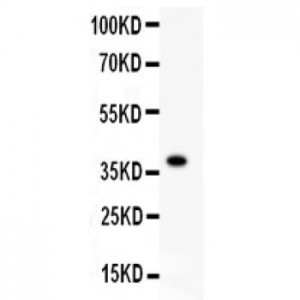More info
Overview
Long Name | Antibody Type | Antibody Isotype | Host | Species Reactivity | Validated Applications | Purification |
| fibroblast growth factor receptor 4 | Polyclonal | IgG | Rabbit | Human | IHC-P, WB | Immunogen affinity purified. |
Immunogen | ||||||
| E.coli-derived human FGFR4 recombinant protein (Position: L22-H206). Human FGFR4 shares 86% and 84% amino acid (aa) sequences identity with mouse and rat FGFR4, respectively. | ||||||
Properties
Form | Lyophilized |
Size | 100 µg/vial |
Contents | Antibody is lyophilized with 5 mg BSA, 0.9 mg NaCl, 0.2 mg Na2HPO4, 0.05 mg NaN3. *carrier free antibody available upon request. |
Concentration | Reconstitute with 0.2 mL sterile dH2O (500 µg/ml final concentration). |
Storage | At -20 °C for 12 months, as supplied. Store reconstituted antibody at 2-8 °C for one month. For long-term storage, aliquot and store at -20 °C. Avoid repeated freezing and thawing. |
Additional Information Regarding the Antigen
Gene | FGFR4 |
Protein | Fibroblast growth factor receptor 4 |
Uniprot ID | P22455 |
Function | Tyrosine-protein kinase that acts as cell-surface receptor for fibroblast growth factors and plays a role in the regulation of cell proliferation, differentiation and migration, and in regulation of lipid metabolism, bile acid biosynthesis, glucose uptake, vitamin D metabolism and phosphate homeostasis. Required for normal down-regulation of the expression of CYP7A1, the rate-limiting enzyme in bile acid synthesis, in response to FGF19. Phosphorylates PLCG1 and FRS2. Ligand binding leads to the activation of several signaling cascades. Activation of PLCG1 leads to the production of the cellular signaling molecules diacylglycerol and inositol 1,4,5-trisphosphate. Phosphorylation of FRS2 triggers recruitment of GRB2, GAB1, PIK3R1 and SOS1, and mediates activation of RAS, MAPK1/ERK2, MAPK3/ERK1 and the MAP kinase signaling pathway, as well as of the AKT1 signaling pathway. Promotes SRC-dependent phosphorylation of the matrix protease MMP14 and its lysosomal degradation. FGFR4 signaling is down-regulated by receptor internalization and degradation; MMP14 promotes internalization and degradation of FGFR4. Mutations that lead to constitutive kinase activation or impair normal FGFR4 inactivation lead to aberrant signaling. |
Tissue Specificity | Expressed in gastrointestinal epithelial cells, pancreas, and gastric and pancreatic cancer cell lines. |
Sub-cellular localization | Cell membrane; Single-pass type I membrane protein. Endosome. Endoplasmic reticulum. Note: Internalized from the cell membrane to recycling endosomes, and from there back to the cell membrane. |
Sequence Similarities | Belongs to the protein kinase superfamily. Tyr protein kinase family. Fibroblast growth factor receptor subfamily. |
Aliases | CD 334 antibody|CD334 antibody|CD334 antigen antibody|fc13h 10 antibody|fc13h10 antibody|Fgfr 4 antibody|FGFR-4 antibody|Fgfr4 antibody|FGFR4_HUMAN antibody|Fibroblast growth factor receptor 4 antibody|Hydroxyaryl protein kinase antibody|JTK 2 antibody|JTK2 antibody|MGC20292 antibody|Protein tyrosine kinase antibody|TKF antibody|Tyrosine kinase related to fibroblast growth factor receptor antibody|Tyrosylprotein kinase antibody |
Application Details
| Application | Concentration* | Species | Validated Using** |
| Western blot | 0.1-0.5μg/ml | Human | AssaySolutio's ECL kit |
| Immunohistochemistry(Paraffin-embedded Section) | 0.5-1μg/ml | Human | AssaySolutio's IHC/ICC Detection kit |
AssaySolution recommends Rabbit Chemiluminescent WB Detection Kit (AKIT001B) for Western blot, and Rabbit Peroxidase IHC/ICC Detection Kit (AKIT002B) for IHC(P). *Blocking peptide can be purchased at $65. Contact us for more information

Anti- FGFR4 antibody, ASA-B0710, Western blotting
All lanes: Anti FGFR4 (ASA-B0710) at 0.5ug/ml
WB: Recombinant Human FGFR4 Protein 0.5ng
Predicted bind size: 39KD
Observed bind size: 39KD
All lanes: Anti FGFR4 (ASA-B0710) at 0.5ug/ml
WB: Recombinant Human FGFR4 Protein 0.5ng
Predicted bind size: 39KD
Observed bind size: 39KD

Anti- FGFR4 antibody, ASA-B0710, Western blotting
All lanes: Anti FGFR4 (ASA-B0710) at 0.5ug/ml
Lane 1: HELA Whole Cell Lysate at 40ug
Lane 2: PANC Whole Cell Lysate at 40ug
Lane 3: SGC Whole Cell Lysate at 40ug
Lane 4: COLO320 Whole Cell Lysate at 40ug
Lane 5: SW620 Whole Cell Lysate at 40ug
Predicted bind size: 88KD
Observed bind size: 100KD
All lanes: Anti FGFR4 (ASA-B0710) at 0.5ug/ml
Lane 1: HELA Whole Cell Lysate at 40ug
Lane 2: PANC Whole Cell Lysate at 40ug
Lane 3: SGC Whole Cell Lysate at 40ug
Lane 4: COLO320 Whole Cell Lysate at 40ug
Lane 5: SW620 Whole Cell Lysate at 40ug
Predicted bind size: 88KD
Observed bind size: 100KD

Anti- FGFR4 antibody, ASA-B0710, IHC(P)
IHC(P): Human Lung Cancer Tissue
IHC(P): Human Lung Cancer Tissue


